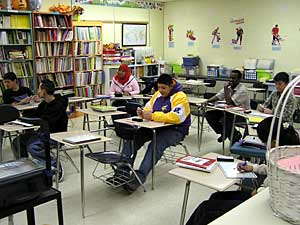|
Photos
|
 |
| Students in Elaine Johnson's class learn to speak and write in English. (MPR Photo/Bob Reha) |
Pelican Rapids, Minn. — It is lunch time at Pelican Rapids High School, 600 kids will file through the cafeteria, pickup trays, get their food, sit down and eat.
The first day of a new semester can be a confusing time; Principal Glen Moerke says there are some new faces. One hundred new students will start classes this year, but another 100 will leave school.
Moerke says it's unusual for a small, rural district to have that kind of turnover, but Pelican Rapids isn't your average small town. The community is diverse; it's popular with immigrants and refugees who have found jobs at the local turkey processing plant.
In the school there are kids from Bosnia and the Ukraine, many of the new students are from Somalia and Mexico. For 25 percent of the kids at Pelican Rapids, English is a new language.
Two years ago this school failed to meet the federal mandates established in the No Child Left Behind law. Moerke says students had low scores in reading and math.
For some students, language is at the heart of learning problems. One teacher works with students on their English, Glen Moerke says the work is literally hands on.
"You'll see her work with the mouth of a student on shaping it and shaping the lips and shaping the tongue and how to force the tongue into the back of the mouth," says Moerke. "Those are the things she knows, so they learn pronunciation, they learn, this word and this picture go together kind of thing."
The work is paying off. This year, the school is meeting the No Child Left Behind standards. If they do it again they'll be off probation. If a school fails to meet federal standards, students can transfer out and parents can ask for individual tutoring. If a school doesn't improve in five years, local officials can lose control. Moerke says there is a sense of relief and accomplishment at the school, but that doesn't mean everyone is convinced the No Child Left Behind law is working. Elaine Johnson teaches English as a second language.
"Sometimes I think decisions are made by people who aren't totally aware of what the real world is like in a school like ours," says Johnson.
Johnson has a part-time teacher's aide, but no other full-time teacher to assist her. Johnson uses some unique techniques to teach the kids.
As a part of a history lesson, Johnson plays the old country song, the Battle of New Orleans. She'll use plastic toys so when kids learn a word like alligator or goose they can say it and see it.
She'll pass out markers and white boards to the kids and pronounce a word, the kids will then write it down on the board. They'll hold it up, if it's written correctly, they move on to the next word, if not they try again.
Johnson says it's hard but rewarding work, she believes one of the key elements in teaching these kids has come outside of the classroom.
"A big thing that's happened is that we're seeing more of our people from the other countries, especially Mexico, realizing the importance of finishing up the entire 12 years of the regular school," says Johnson.
Johnson says the school has reached out to adults from immigrant families; there are night classes for people who want to learn English. The classes are popular because they help parents understand, it's important for their kids to stay in school.
Osmand Diriye works at the local turkey processing plant. He brought his family from Somalia three years ago and is enrolled in one of the classes.
Diriye wants to continue his education, once he conquers English, he wants to tackle Spanish, he believes becoming multi-lingual will help him get a better job.
"If I can learn three languages, Somalia, English and Spanish, maybe I can become a translator or I can learn to work in human services, which is my dream," says Diriye.
Diriye is pleased with the Pelican Rapids school system and believes the school is doing a good job teaching his six children. He says it's difficult for his family to learn a new language and customs, but it's a challenge he thinks they will master.







